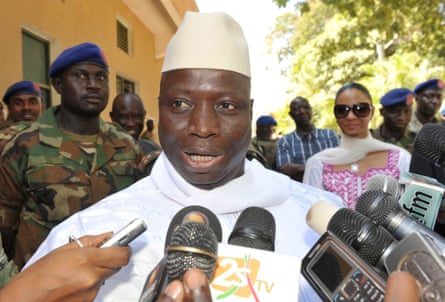The claim that the international criminal court unfairly targets Africans is gaining significant traction after the Gambia became the third country on the continent to announce its withdrawal from the Hague-based tribunal.
The move follows similar announcements from Burundi and South Africa, who informed the UN secretary-general, Ban Ki-moon, of their decision to quit the court last week, making them the first countries to begin the year-long exit process in the court’s 18-year history.
Burundi’s parliament has claimed the court is merely “a political tool used by [foreign] powers to remove whoever they want from power on the African continent”.
The ICC had said in April it would investigate outbreaks of violence in Burundi, which has been mired in a political crisis for more than a year.
South Africa announced it would be leaving the court on similar grounds, arguing that the ICC’s Rome statutes were at odds with its own laws granting leaders diplomatic immunity.
There have been a number of complaints that the ICC is biased, and some politicians have denouncing the tribunal as an instrument of colonial justice.
Of the 10 cases being investigated by the court, nine involve African countries, including all three trials. So far, ICC arrest warrants have only ever been issued for Africans.
While there may be sound reasons for this – five African countries have referred themselves to the court, for example, and 33 African states have ratified the Rome statute that established the ICC, making Africa the largest continental bloc – the perception that it targets Africans exclusively has left the court vulnerable.
As a result, the court is facing what appears to be a coordinated revolt that risks destroying its legitimacy.
Among political analysts there is little doubt that more African countries will announce their intention to withdraw in the next few weeks, with Chad, Kenya and Namibia all likely candidates.
Allan Ngari, researcher at the Institute for Security Studies, said the announcements “must be part of a plan”, particularly the latest move by the Gambia.
“That Fatou Bensouda, the chief prosecutor of the international criminal court, is from the very state that has made the most recent withdrawal can only speak of a deliberate effort to hurt the court, particularly the organ which has had the most interface with African states, which is the office of the prosecutor,” said Ngari.

Bensouda, a Gambian citizen, took on the court’s leading job in 2012, and it was hoped by some that her nationality would assuage some of the court’s African critics.
But this week her country’s government resounding rejected the court. “The ICC, despite being called international criminal court, is in fact an international Caucasian court for the persecution and humiliation of people of colour, especially Africans,” said Sheriff Bojang, the Gambia’s information minister.
So what now for the ICC? Kelly-Jo Bluen, an expert at the Institute for Justice and Reconciliation, said the withdrawals would be a blow for the ICC, but suggested a mass African exodus was unlikely.
“I imagine we will see further withdrawals, but I am not convinced by the idea that there will be an Africa-wide withdrawal. Some states will remain ICC members because of ongoing support for the court, while other states view the court as a useful tool in maligning opposition domestically,” she said.
Some African countries, most notably Botswana, have not joined in the chorus of anti-ICC sentiment. In a statement released on Wednesday, the government reiterated its support for the tribunal.
“Botswana is convinced that as the only permanent international criminal tribunal, the ICC is an important unique institution in the international criminal justice system. Botswana therefore wishes to reaffirm its membership of the Rome statute and reiterate its support for a strong international criminal justice system through the ICC,” the statement read.
Senegal has declined to take an official position, but its justice minister, Sidiki Kaba, who also happens to be the current president of the assembly of state parties to the Rome statute of the international criminal court, has urged South Africa and Burundi to reconsider their positions.
So while it may be wounded, the ICC is not dead in Africa – not yet. The anti-ICC brigade is strong and growing, but it does not yet enjoy complete continent-wide support.

Comments (…)
Sign in or create your Guardian account to join the discussion